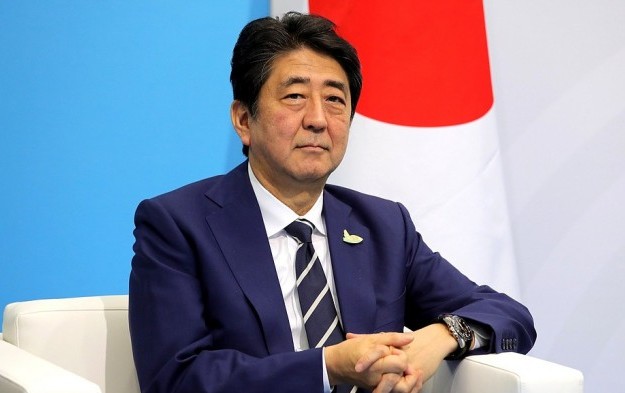Japan casino headwind as Abe fortunes wane: analyst
Jul 24, 2017 Newsdesk Japan, Latest News, Top of the deck

Recent local election results and an opinion poll suggesting a decline in public support for Japan’s Prime Minister Shinzo Abe (pictured) “could easily create a headwind” regarding parliamentary passage this year of legislation for creation of a casino industry, says a gaming sector analyst.
“Continued negative coverage of the Abe administration, coupled with political losses for the Liberal Democratic Party (i.e., Tokyo assembly and Sendai mayoral elections) may reduce support for the gaming agenda, which already has only limited public support,” stated Vitaly Umansky of brokerage Sanford C. Bernstein Ltd, in an emailed reply to a question from GGRAsia on possible shifts in Japan’s political climate.
Reuters news agency said in a Sunday report that a poll published that day in the politically centre-left newspaper Mainichi Shimbun – from responses gathered from the public on July 22 and 23 – indicated support for Mr Abe had slipped 10 points, to 26 percent. The survey also indicated that 56 percent of respondents did not back his government – a 12-point rise from a previous survey in June. The governing Liberal Democratic Party (LDP) is politically centre-right.
While it is common for democratic political parties controlling national governments to experience setbacks in local elections held in mid-term, gaming analysts have noted that the emphasis in Japan on reaching cross-party consensus when taking major political decisions could be an impediment to two pieces of legislation necessary for formalising the central government’s casino policy.
One of the bills will contain measures to tackle gambling addiction, and might be announced in draft form in August for public consultation, officials said in June.
Then, under a best-case scenario, another draft statute, the Integrated Resort (IR) Implementation Bill, might be passed by the country’s parliament in the 2017 extraordinary session starting in the autumn, suggested a note in May from banking group Morgan Stanley.
Union Gaming Securities Asia Ltd had said in a July 5 note that the LDP’s losses in the Tokyo local election at the start of July might have made it harder for Mr Abe to get the consensus needed to pass in parliament the implementation bill. That was followed this Sunday by a win for an independent candidate – backed by the opposition Democratic Party – in the race for the mayoralty of Sendai.
Some analysts and industry commentators have noted that should there be any moves by the Japanese authorities to discourage or even bar locals from gambling in Japanese casino resorts – in order to calm public fears about gambling addiction among Japanese – it might mean the resorts would depend for revenue on Chinese tourists, and the maintenance of good political relations between China and Japan.
On July 17 Union Gaming said in a note: “It is imperative that an IR operator [in Japan] has the stability and visibility offered by a strong locals contribution to gaming revenue. Without this key and dependable segment, the fortunes of the IRs in Japan will have a disproportionately large weighting towards China government policy.”
Sanford Bernstein’s Mr Umansky noted in his comments to GGRAsia: “The other geopolitical risk that has resurfaced is North Korea. Further escalation of tensions, may also reduce political support [in Japan] to get gaming legislation passed quickly, as the political situation refocuses its [the Japanese government’s] energies.”
Related articles
-
 Some players avoiding Macau amid cash...
Some players avoiding Macau amid cash...Jul 02, 2024
-
 Hokkaido assembly LDP reps show...
Hokkaido assembly LDP reps show...Jun 25, 2024
More news
-
 Donaco EBITDA up y-o-y to above US$4mln...
Donaco EBITDA up y-o-y to above US$4mln...Jul 26, 2024
-
 HK listed Palasino upgrades Czech...
HK listed Palasino upgrades Czech...Jul 26, 2024
Latest News
Jul 26, 2024
Border-casino operator Donaco International Ltd has achieved a 164.17-percent year-on-year increase in its latest quarterly group earnings before interest, taxation, depreciation and amortisation...Sign up to our FREE Newsletter
 (Click here for more)
(Click here for more)
Pick of the Day
”We’ve got more traction outside of Macau at the moment. But Macau’s going be a bigger focus for us”
David Punter
Regional representative at Konami Australia
Most Popular
 Sheraton brand to exit Londoner Macao, to be Londoner Grand July 25, 2024
Sheraton brand to exit Londoner Macao, to be Londoner Grand July 25, 2024  Macau regulator probes unlicensed gaming agents July 24, 2024
Macau regulator probes unlicensed gaming agents July 24, 2024  Philippines gives 20k aliens in POGOs 60 days to leave July 25, 2024
Philippines gives 20k aliens in POGOs 60 days to leave July 25, 2024  Philippines-listed DigiPlus says not affected by POGO ban July 24, 2024
Philippines-listed DigiPlus says not affected by POGO ban July 24, 2024  Sands China 2Q EBITDA down q-o-q amid low hold, renovation July 25, 2024
Sands China 2Q EBITDA down q-o-q amid low hold, renovation July 25, 2024






